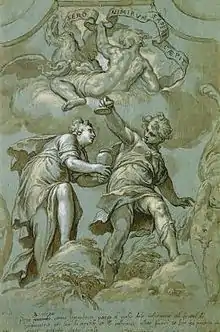Epimetheus
In Greek mythology, Epimetheus (/ɛpɪˈmiːθiəs/; Greek: Ἐπιμηθεύς, lit. "afterthought"[1]) was the brother of Prometheus (traditionally interpreted as "foresight", literally "fore-thinker"), a pair of Titans who "acted as representatives of mankind".[2] They were the sons of Iapetus,[3] who in other contexts was the father of Atlas. While Prometheus is characterized as ingenious and clever, Epimetheus is depicted as foolish.
| Epimetheus | |
|---|---|
God of afterthought | |
 Pandora offers the jar to Epimetheus. | |
| Personal information | |
| Parents | Iapetus and Clymene |
| Siblings | Prometheus, Menoetius, Atlas |
| Consort | Pandora |
| Children | Prophasis, Pyrrha |
Mythology
| Greek deities series |
|---|
| Titans |
According to Plato's use of the old myth in his Protagoras (320d–322a), the twin Titans were entrusted with distributing the traits among the newly created animals. Epimetheus was responsible for giving a positive trait to every animal, but when it was time to give man a positive trait, lacking foresight he found that there was nothing left.[4] Prometheus decided that humankind's attributes would be the civilising arts and fire, which he stole from Athena and Hephaestus. Prometheus later stood trial for his crime. In the context of Plato's dialogue, "Epimetheus, the being in whom thought follows production, represents nature in the sense of materialism, according to which thought comes later than thoughtless bodies and their thoughtless motions."[5]
According to Hesiod, who related the tale twice (Theogony, 527ff; Works and Days 57ff), Epimetheus was the one who accepted the gift of Pandora from the gods. Their marriage may be inferred (and was by later authors), but it is not made explicit in either text. In later myths, the daughter of Epimetheus and Pandora was Pyrrha, who married Deucalion, a descendant of Prometheus. Together they are the only two humans who survived the deluge.[6] In some accounts, Epimetheus had another daughter, Metameleia, whose name means "regret of what has occurred" for those that do not plan ahead will only feel sorrow when calamity strikes.[7] According to a scholion on Apollonius of Rhodes' Argonautica, Eumelos states that Epimetheus' wife was called Ephyra, daughter of Oceanus and Tethys.[8]
In modern culture
In his seminal book Psychological Types, in chapter X, "General description of the types", Carl Jung uses the image of Epimetheus (with direct reference to Carl Spitteler's Epimetheus) to refer to the false application of a mental function, as opposed to its whole, healthy, and creative use.[9]
Epimetheus plays a key role in the philosophy of Bernard Stiegler, and in particular in terms of his understanding of the relation between technogenesis and anthropogenesis; according to Stiegler, it is significant that Epimetheus is entirely forgotten in the philosophy of Martin Heidegger.
Genealogy
| Epimetheus's family tree[10] |
|---|
Notes
- Yasumura, p. 110.
- Kerényi, p. 207.
- Hesiod, Theogony 507–12; Hard, p. 49.
- Leo Strauss, Natural Right and History, p. 117.
- Leo Strauss, Natural Right and History, p. 117.
- Ovid, Metamorphoses, Book I, line 390.
- John Tzetzes. Chiliades, 6.50 lines 913-916.
- Gantz, p. 157; Eumelus fr. 1b Fowler, p. 106 [= FGrHist 451 F1b = Scholia on Apollonius of Rhodes, 4.1212/14b (Wendel, p. 310)].
- Jung, Carl (1921). "X. General description of the types". Psychological Types. Retrieved 9 June 2017.
- Hesiod, Theogony 132–138, 337–411, 453–520, 901–906, 915–920; Caldwell, pp. 8–11, tables 11–14.
- Although usually the daughter of Hyperion and Theia, as in Hesiod, Theogony 371–374, in the Homeric Hymn to Hermes (4), 99–100, Selene is instead made the daughter of Pallas the son of Megamedes.
- According to Hesiod, Theogony 507–511, Clymene, one of the Oceanids, the daughters of Oceanus and Tethys, at Hesiod, Theogony 351, was the mother by Iapetus of Atlas, Menoetius, Prometheus, and Epimetheus, while according to Apollodorus, 1.2.3, another Oceanid, Asia was their mother by Iapetus.
- According to Plato, Critias, 113d–114a, Atlas was the son of Poseidon and the mortal Cleito.
- In Aeschylus, Prometheus Bound 18, 211, 873 (Sommerstein, pp. 444–445 n. 2, 446–447 n. 24, 538–539 n. 113) Prometheus was born the son of Themis.
References
- Fowler, R. L., Early Greek Mythography: Volume 1: Text and Introduction, Oxford University Press, 2000. ISBN 978-0198147404. Google Books.
- Gantz, Timothy, Early Greek Myth: A Guide to Literary and Artistic Sources, Johns Hopkins University Press, 1996, Two volumes: ISBN 978-0-8018-5360-9 (Vol. 1), ISBN 978-0-8018-5362-3 (Vol. 2).
- Hard, Robin, The Routledge Handbook of Greek Mythology: Based on H.J. Rose's "Handbook of Greek Mythology", Psychology Press, 2004. ISBN 978-0-415-18636-0. Google Books.
- Hesiod, Theogony, in The Homeric Hymns and Homerica with an English Translation by Hugh G. Evelyn-White, Cambridge, Massachusetts, Harvard University Press; London, William Heinemann Ltd., 1914. Online version at the Perseus Digital Library. Internet Archive.
- Kerényi, Karl, The Gods of the Greeks, Thames and Hudson, London, 1951. Internet Archive.
- Wendel, Carl, Scholia in Apollonium Rhodium vetera, Hildesheim, Weidmann, 1999. ISBN 978-3-615-15400-9. Google Books.
- Yasumura, Noriko, Challenges to the Power of Zeus in Early Greek Poetry, Bloomsbury Academic, London, 2011. ISBN 978-1-472-51968-9. Google Books.
External links
 Media related to Epimetheus at Wikimedia Commons
Media related to Epimetheus at Wikimedia Commons